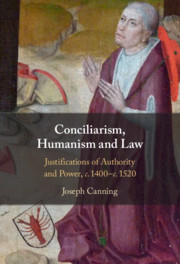4 - The Law
Published online by Cambridge University Press: 18 June 2021
Summary
This chapter considers Roman and canon law, the English common law tradition and French juristic thought. Roman and canon law jurisprudence of the fourteenth and fifteenth centuries are taken together because fifteenth-century jurists tended to reiterate the works of fourteenth-century ones. The chapter considers whether jurists contributed to the early development of international law. The impact of humanism on law is also discussed – notably in the case of Lorenzo Valla's destruction of the authenticity of the Donation of Constantine. The English common law tradition is considered through the writings of Sir John Fortescue: notably his justifications of English kingship. The French juristic tradition is considered through its two most important theorists: Jean de Terrevermeille and Claude de Seyssel. Terrevermeille made the most detailed contributions to the notions of the mystical body of the kingdom ever put forward in the Middle Ages. Seyssel, through elaborating the three bridles on royal power (religion, justice and the police) justified an absolute monarchy limited by higher norms, a solution fundamental for centuries throughout the ancien régime
- Type
- Chapter
- Information
- Conciliarism, Humanism and LawJustifications of Authority and Power, c. 1400–c. 1520, pp. 144 - 178Publisher: Cambridge University PressPrint publication year: 2021

